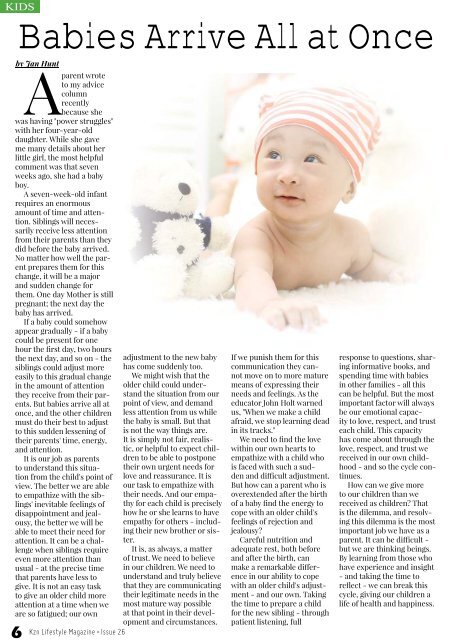Create successful ePaper yourself
Turn your PDF publications into a flip-book with our unique Google optimized e-Paper software.
KIDS<br />
Babies Arrive All at Once<br />
by Jan Hunt<br />
A<br />
parent wrote<br />
to my advice<br />
column<br />
recently<br />
because she<br />
was having "power struggles"<br />
with her four-year-old<br />
daughter. While she gave<br />
me many details about her<br />
little girl, the most helpful<br />
comment was that seven<br />
weeks ago, she had a baby<br />
boy.<br />
A seven-week-old infant<br />
requires an enormous<br />
amount of time and attention.<br />
Siblings will necessarily<br />
receive less attention<br />
from their parents than they<br />
did before the baby arrived.<br />
No matter how well the parent<br />
prepares them for this<br />
change, it will be a major<br />
and sudden change for<br />
them. One day Mother is still<br />
pregnant; the next day the<br />
baby has arrived.<br />
If a baby could somehow<br />
appear gradually - if a baby<br />
could be present for one<br />
hour the first day, two hours<br />
the next day, and so on - the<br />
siblings could adjust more<br />
easily to this gradual change<br />
in the amount of attention<br />
they receive from their parents.<br />
But babies arrive all at<br />
once, and the other children<br />
must do their best to adjust<br />
to this sudden lessening of<br />
their parents' time, energy,<br />
and attention.<br />
It is our job as parents<br />
to understand this situation<br />
from the child's point of<br />
view. The better we are able<br />
to empathize with the siblings'<br />
inevitable feelings of<br />
disappointment and jealousy,<br />
the better we will be<br />
able to meet their need for<br />
attention. It can be a challenge<br />
when siblings require<br />
even more attention than<br />
usual - at the precise time<br />
that parents have less to<br />
give. It is not an easy task<br />
to give an older child more<br />
attention at a time when we<br />
are so fatigued; our own<br />
6<br />
adjustment to the new baby<br />
has come suddenly too.<br />
We might wish that the<br />
older child could understand<br />
the situation from our<br />
point of view, and demand<br />
less attention from us while<br />
the baby is small. But that<br />
is not the way things are.<br />
It is simply not fair, realistic,<br />
or helpful to expect children<br />
to be able to postpone<br />
their own urgent needs for<br />
love and reassurance. It is<br />
our task to empathize with<br />
their needs. And our empathy<br />
for each child is precisely<br />
how he or she learns to have<br />
empathy for others - including<br />
their new brother or sister.<br />
It is, as always, a matter<br />
of trust. We need to believe<br />
in our children. We need to<br />
understand and truly believe<br />
that they are communicating<br />
their legitimate needs in the<br />
most mature way possible<br />
at that point in their development<br />
and circumstances.<br />
Kzn Lifestyle Magazine • Issue 26<br />
If we punish them for this<br />
communication they cannot<br />
move on to more mature<br />
means of expressing their<br />
needs and feelings. As the<br />
educator John Holt warned<br />
us, "When we make a child<br />
afraid, we stop learning dead<br />
in its tracks."<br />
We need to find the love<br />
within our own hearts to<br />
empathize with a child who<br />
is faced with such a sudden<br />
and difficult adjustment.<br />
But how can a parent who is<br />
overextended after the birth<br />
of a baby find the energy to<br />
cope with an older child's<br />
feelings of rejection and<br />
jealousy?<br />
Careful nutrition and<br />
adequate rest, both before<br />
and after the birth, can<br />
make a remarkable difference<br />
in our ability to cope<br />
with an older child's adjustment<br />
- and our own. Taking<br />
the time to prepare a child<br />
for the new sibling - through<br />
patient listening, full<br />
response to questions, sharing<br />
informative books, and<br />
spending time with babies<br />
in other families - all this<br />
can be helpful. But the most<br />
important factor will always<br />
be our emotional capacity<br />
to love, respect, and trust<br />
each child. This capacity<br />
has come about through the<br />
love, respect, and trust we<br />
received in our own childhood<br />
- and so the cycle continues.<br />
How can we give more<br />
to our children than we<br />
received as children? That<br />
is the dilemma, and resolving<br />
this dilemma is the most<br />
important job we have as a<br />
parent. It can be difficult -<br />
but we are thinking beings.<br />
By learning from those who<br />
have experience and insight<br />
- and taking the time to<br />
reflect - we can break this<br />
cycle, giving our children a<br />
life of health and happiness.

















